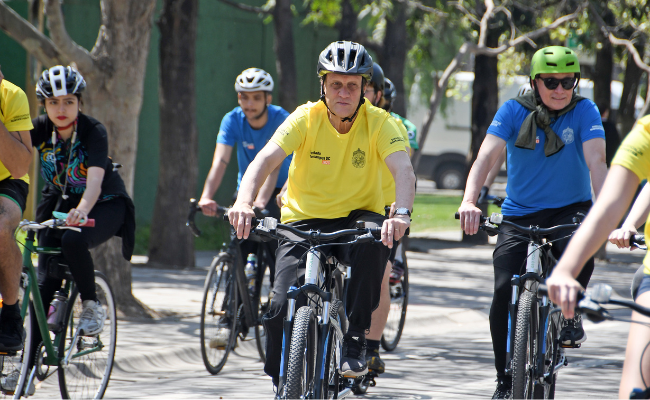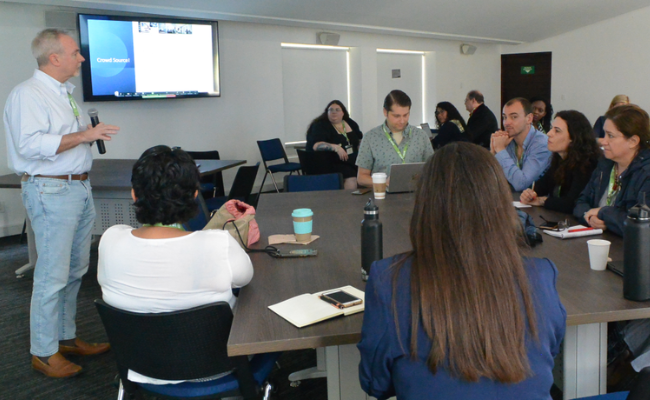Pathways to Carbon Neutrality: UC Chile Climate Action Strategy
The current global climate crisis, in which global warming is on the verge of exceeding the 1.5°C threshold this century, necessitates immediate action. In this urgent context, UC Chile joined the global challenge of halting the progress of climate change, committing to become a carbon-neutral university by 2038, coinciding with its 150th anniversary and advancing 12 years ahead of the national target planned for the year 2050.
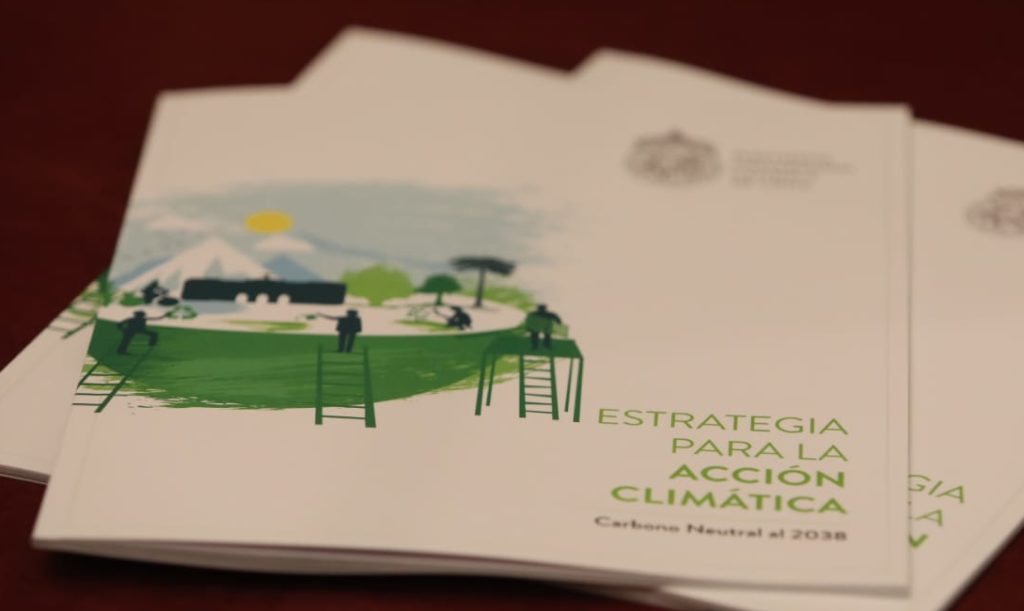
Since 2020, extensive work has been carried out in 10 thematic areas with the participation of academics, administrative staff, and students, guided by coordinators and the UC Climate Action Council, with the aim of developing the UC Climate Action Strategy presented in 2023.
"We know that significant solutions must primarily come from high-level political decisions, but we also understand that every effort counts. UC Chile's commitment to reducing pollution is creating a new culture within the university and, most importantly, a culture that impacts society as a whole."
UC Chile Rector Ignacio Sánchez (pictured above in yellow)
To guide the strategy development process, the university created a Climate Action Council, which includes directors of management units, research centers, academics, and students. This council has the responsibility to monitor progress and guide next steps in finding new solutions to reduce institutional carbon emissions.
The Strategy encompasses the implementation of 18 projects related to energy and construction, transportation and travel, water and biodiversity, waste, education, research, and culture. While the main objective is to achieve carbon neutrality, the university decided to incorporate components of adaptation and resilience, as well as aspects of education, research, and culture inherent to a higher education institution.
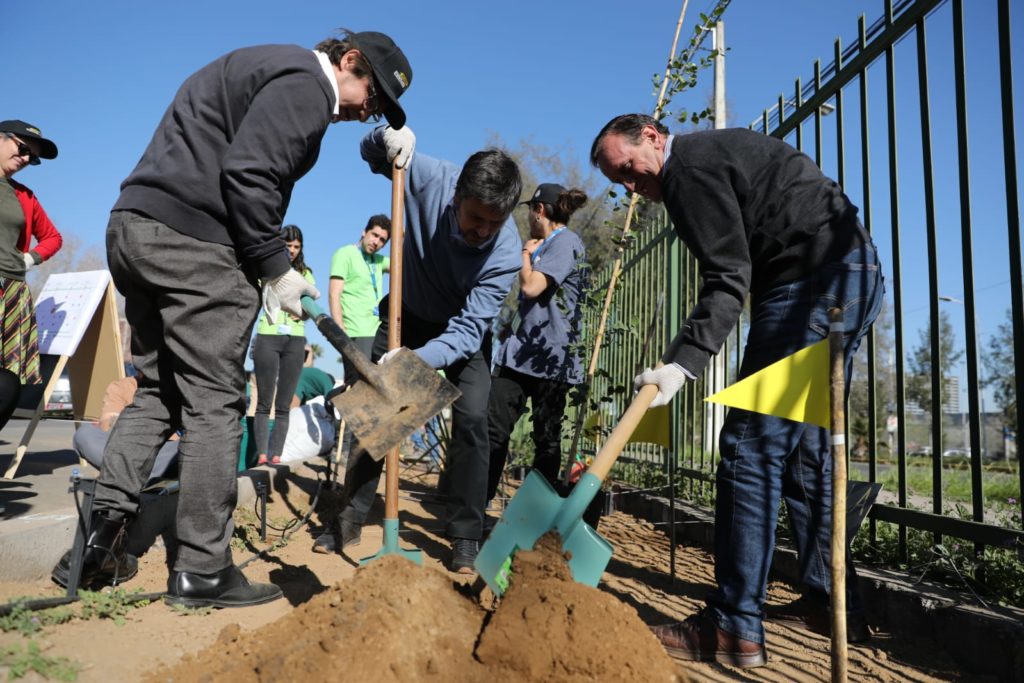
Several projects have been implemented, such as the creation of a new energy management system and initiatives to promote electromobility. Soon, a competition for energy efficiency for administrative and academic units will be launched. Throughout 2022 and 2023, participatory forestations were held on the San Joaquín campus, the largest campus at UC Chile and visited by over 30,000 people daily. Six hundred members of the UC community participated.
Travel and daily transportation account for over 70% of the university's carbon footprint. To address these issues, the Global Mobility Office and the Sustainability Office have initiated joint efforts to reduce the impact of global mobility, implementing initiatives such as a Green Guide for exchange students, a new Seed Fund financed by student exchange trips, and a forthcoming platform for travel registration and carbon footprint calculation.
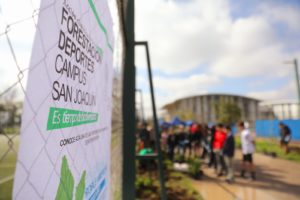 Currently, the university is assessing progress in implementing the strategy and exploring additional projects that contribute to climate action. Additionally, it is consistently implementing programs, activities, and campaigns aimed at fostering sustainability awareness within the university.
Currently, the university is assessing progress in implementing the strategy and exploring additional projects that contribute to climate action. Additionally, it is consistently implementing programs, activities, and campaigns aimed at fostering sustainability awareness within the university.
Sustainability Reporting Survey Results Released
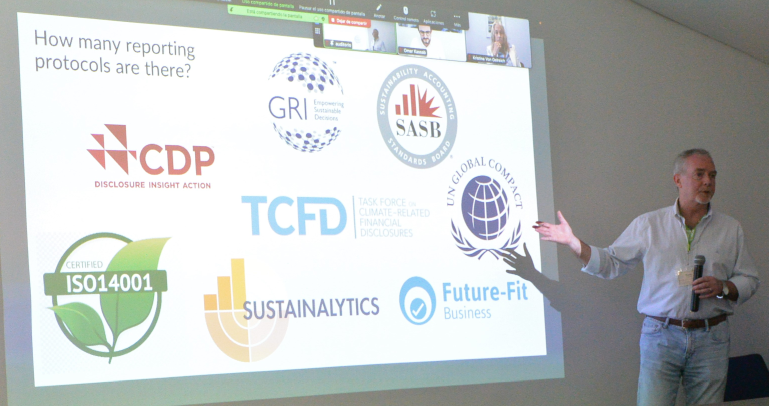
Across the globe, sustainability has become a strategic theme for higher education institutions. Not only in the traditional domains of research and teaching, but also in the institution’s mission and planning, public engagement, campus operations, and other related contexts. A key means for institutions to monitor and report their progress is sustainability reporting.
Based on this observation, the ISCN Sustainability Reporting Group developed a survey in late 2022 to gain an understanding of existing sustainability reporting practices in the global higher education sector. The survey also aimed to identify challenges and opportunities to improve current practices of sustainability reporting and form the basis for policy recommendations.
The survey covered a range of topics including the strategic priority of sustainability, reporting standards used, stakeholder influence, drivers, and many more. Sixty-nine valid responses were analysed.
Seven key insights were drawn from the survey responses.
- Sustainability is of strategic importance. Unsurprisingly given who was surveyed, sustainability is a strategic importance for respondents, particularly for ISCN members. University size or location does not impact strategic importance significantly. Almost all respondent universities define sustainability goals.
- Leadership counts. University leadership has the greatest influence on making sustainability a priority at an institution. Students, staff, and academics/faculty have a similar amount of influence. External entities like government, industry and society has some but lesser influence.
- Size and resources are related. The larger the university, the more likely there is a sustainability office.
- Reporting faces internally. Staff (academic and professional) and students are the priority target groups of sustainability reporting for respondents.
- Sustainability reporting is collaborative. More than 10 people are involved in the sustainability reporting process for universities across ISCN membership, location, and university size. A wide variety of units across the university are involved.
- Reporting is driven by commitment and better decision making. The two most important drivers for respondents were "Monitoring progress of sustainability performance to inform decision-making processes" and "Intrinsic belief in the importance of sustainability".
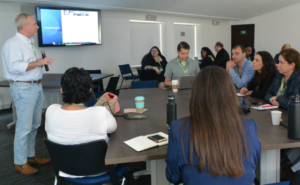
The Reporting Group then followed up with a workshop discussion at the 2023 ISCN Conference in Mexico City, where members discussed the preliminary results and agreed with the final conclusion:
7. There is no reporting standard.
Workshop members asked the Reporting Group to consider how ISCN might co-develop a general reporting standard that could become recognizable in the manner of corporate ESG reporting frameworks.
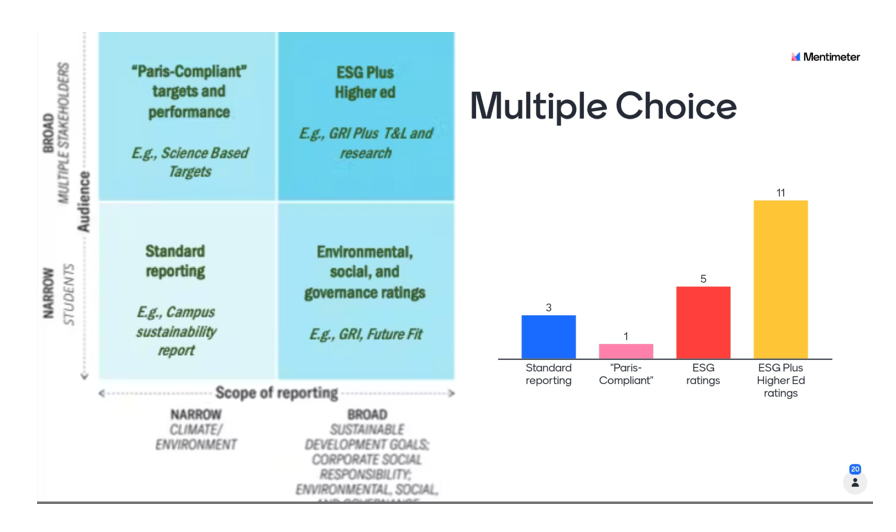
Download the ISCN Sustainability Reporting Survey Summary - April 2024 (PDF)
Many thanks to everyone that completed the survey, and current and former members of the sustainability reporting group for their work:
Ana Carla Madeira, Universidade do Porto (Portugal)
Andreas Dionyssiou, Cyprus University of Technology (Cyprus)
Angel Calderon, Royal Melbourne Institute of Technology (Australia)
Anna Berglund, formerly KTH Royal Institute of Technology (Sweden)
Claudia Zingerli Glatt, ETH Zurich (Switzerland)
Davis Bookhart, Northeastern University (USA)
Dimitrios Noukakis, EPFL (Switzerland)
Jen Crothers, ISCN
Kristina Von Oelreich, KTH Royal Institute of Technology (Sweden)
Omar Kassab, formerly ETH Zurich (Switzerland)
Paul Cross, ETH Zurich (Switzerland)
Sebastian Kahlert, ETH Zurich (Switzerland)
Sonja Moghaddari, EPFL (Switzerland)
Xime Trujillo, University of Pennsylvania (USA)
Please email [email protected] if you are interested in joining the group.
Using the building design and delivery process to deliver carbon reduction
Webinar featuring Corey Peterson, Chief Sustainability Officer at the University of Tasmania
ISCN 2024 UTAS Webinar - Embodied carbon presentation
Date: May 28 / May 29 (Asia, Oceania)
Time:
Australia (AEST): 7-8:15am May 29
Pacific Daylight Time (PDT): 2-3:15pm May 28
Eastern Daylight Time (EDT): 5-6:15pm May 28
Check the start time in your time zone and download a calendar link for this event.
Details:
Together, building operations and construction now account for nearly 40% of global energy-related CO2 emissions (UNEP 2021). The University of Tasmania is undertaking a $750+m redevelopment of our campuses in Tasmania and New South Wales. Given our world leading Times Higher Education Impact #1 ranking for Climate Action, Carbon Neutral certification (one of three certified carbon neutral Australian universities), and being a Race to Zero signatory, we have worked to minimise embodied carbon in our building efforts. Our Emissions Reduction Strategic Plan 2022-2030 requires a minimum 50% reduction in gross emissions across all three scopes.
Our Facilities, Sustainability and Finance staff co-designed an approach to align our environmental and financial sustainability goals through innovative financing approach - our Green Bond Framework. The funding received allowed us to avoid 13,527 tCO2e across five projects at the end of 2023, averaging upfront carbon reductions of over 34% for new builds and over 60% for re-purposing existing buildings compared to reference buildings. A continuous improvement approach allowed achieving more reductions over time through a design focus and industry cooperation and upskilling.
Webinar participants will gain an understanding that embodied carbon reduction requires a focus on upfront carbon reduction very clearly in project scopes to guide design and delivery. Industry also needs to step up with viable options, from materials replacement through to de-materialisation, as well as reduced carbon alternatives. It also requires upskilling of all those involved in the building process (from designers and quantity surveyors through to the construction companies, including project managers and the trades) to understand carbon emissions impact issues within their professions.
Corey Peterson is the Chief Sustainability Officer at the University of Tasmania in Australia and charged with advancing a holistic organisational sustainability agenda. He was on the University of Tasmania Governing Council from 2012-2020 and is the current President of Australasian Campuses Towards Sustainability (ACTS). He has also served on the Board of several community organisations, including Sustainable Living Tasmania for ten years (five as President), is a graduate of the Tasmanian Leaders Program and has joint Masters Degrees in Environmental Science and Public Administration. He also spent 16 years supporting science in Antarctica before immigrating to Tasmania.
